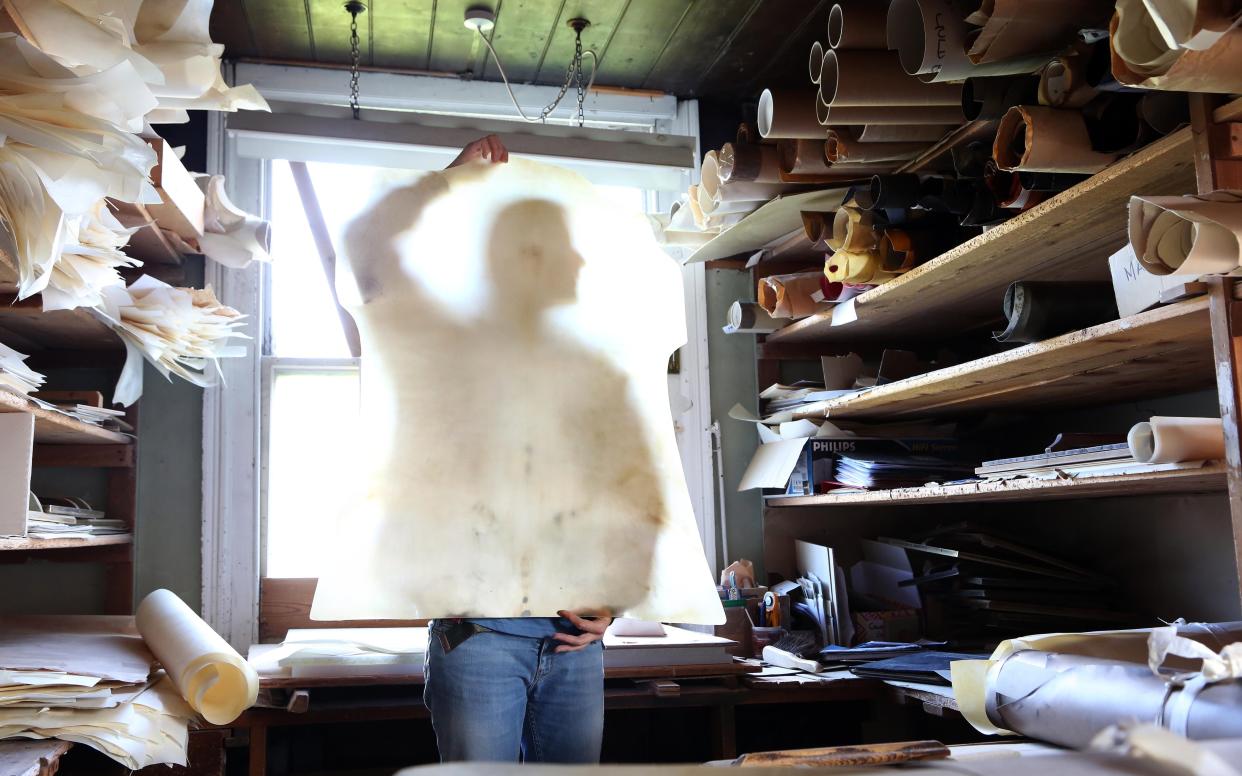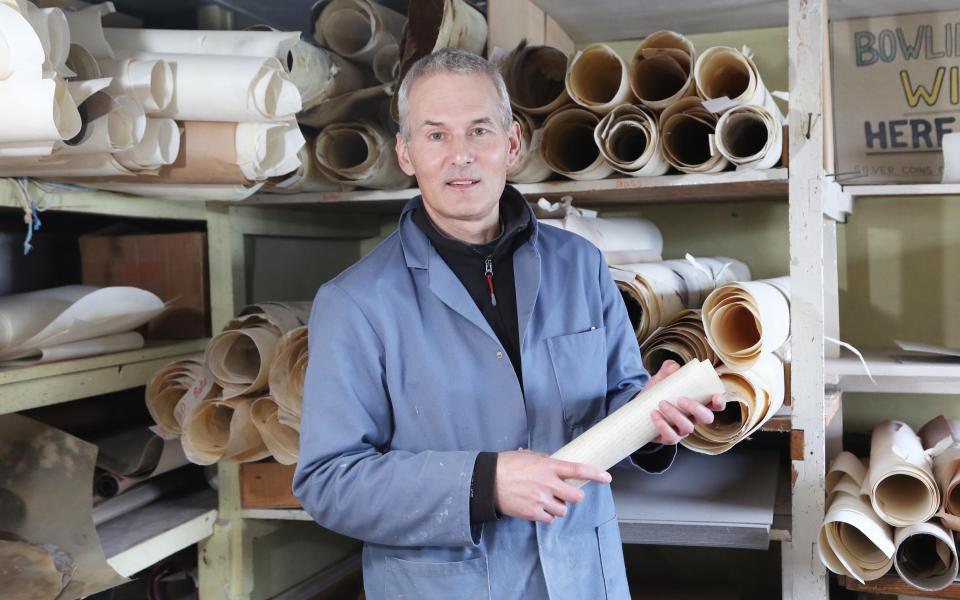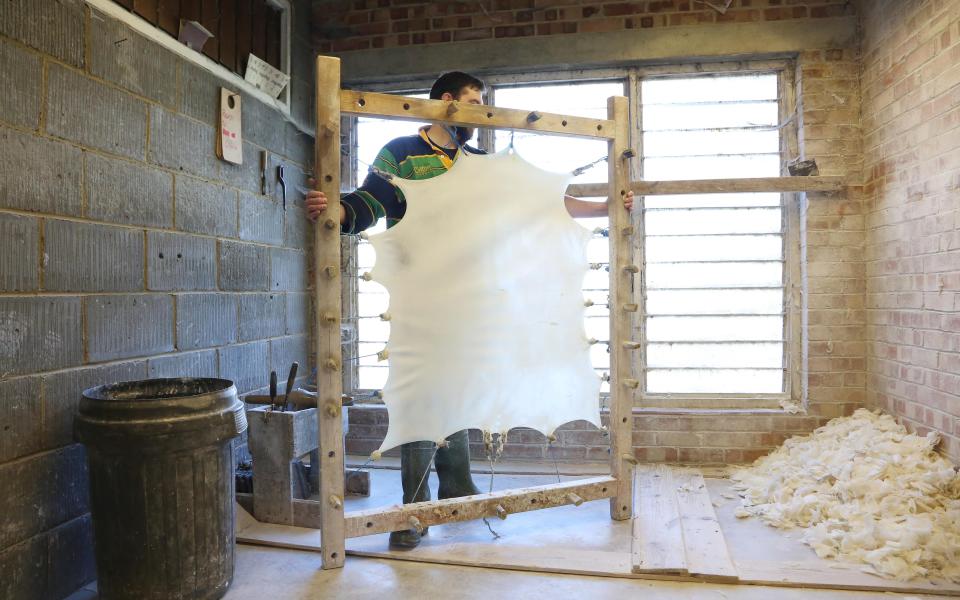Papering over tradition: the fury of Britain's last vellum maker

“We’re an international embarrassment!” 50-year-old Paul Wright is furious. The manager of William Cowley, the last surviving vellum makers in the country, has been at the centre of one of this year’s more niche parliamentary debates. Forget Brexit, his cause is the use of vellum (calfskin) in the Houses of Parliament to record Acts of Parliament.
Vallum – a material that would otherwise go to waste – has been used to print the Magna Carta, the Domesday Book and thousands of other historical documents. Now, the House of Lords want to abandon vellum on the grounds that it is too expensive, and revert to archival paper that is said to last up to 500 years. In comparison, vellum keeps forever.
“Speaking as Paul the taxpayer, I’m fuming!” Wright sniffs. “We are the envy of the world because of our records. No one else has got a Magna Carta. Most nations are desperate to get to where we are with our history, and we’re turning around and saying, ‘oh well, we won’t bother recording it now.’ I just can’t understand it.”

Wright believes that the argument against vellum is short-sighted. James Gray, the MP for North Wiltshire who has brought the debate back to Westminster, agrees. He is cynical about the financial argument, which remains confused. The reported savings to the taxpayer are £80,000 – just £6,000 more than an MP’s salary, but by Wright’s calculations, the cost is closer to £47,000, the amount that he is paid. The money is petty cash compared to the maintenance work well overdue on the Westminster estate, Gray says, also pointing out that forthcoming boundary changes will cut back the number of MPs. Wright offers another solution: “you could put the price of a cup of tea up by five pence, and have enough money for the next 50 years.”
The use of vellum has been the subject of debate in Westminster before. Back in 1999 – the same year that Tony Blair expelled almost all of the hereditary peers from the House of Lords – the case for vellum was tried in the Lords. They voted for change, but when the Commons blocked it, vellum continued to be used.
The subject was reignited in October last year, when James Gray discovered that the Lords were due to debate it again. A campaign, along with its own hashtag (#savevellum) started up, and Gray submitted two Points of Order to Speaker John Bercow to ask whether the Commons would be able to vote on it.
Bercow's confirmation that vellum was a matter for “the other place” – the House of Lords – was not to Gray’s satisfaction. Using the mechanism of the Backbench Business Committee, he organised a debate in the Commons, now set for the end of April. During Gray's travails with vellum, Matthew Hancock, Paymaster General, pledged that the Cabinet office would foot the bill instead. No confirmation from Hancock has yet been sought, but Gray remains “warmly confident” that they will win.
But what of Paul Wright, the man whose livelihood is at stake? He says that William Crowley will not go bust without the parliamentary contract – they are not his only customer, but they are a significant one. Others include the royal family: when Prince William asked the Queen for permission to marry Kate Middleton, Her Majesty signed the Instrument of Consent on a piece of William Cowley vellum.
Wright came to vellum unexpectedly. After taking a degree in engineering from the Atomic Weapons Research Establishment, he began work in automotive manufacturing. It was Wim Visscher, the great-great grandson of William Cowley, who appointed Wright, and taught him how to make vellum. “I don’t know how he found me. He was the only parchment maker in the country. It was just fate, meant to be.”

He loves vellum. “It gets under your skin, into your blood. The work that most people do is mundane, but we provide materials for people to record the history of their nation which is going to last for the next 5000 years. That’s something to puff your chest out about.”
If parliament stops the use of vellum to record acts of parliament, Wright believes that this is the first step to eroding tradition. “Why bother doing the 21 gun salute with a cannon? Why not do it with air rifles, if that’s the attitude?” he asks.
Gray agrees that it is the thin end of the wedge. “It would be easy to melt down the mace, take away the Serjeant at Arms in his funny uniform, and turn the place into a museum, if all you’re worried about is the money. You preserve parliament by preserving some of the visible things of it – the strange way we sit in the chamber, the odd way in which the Speaker proceeds in the morning. Vellum is part of that."
The House of Lords’ idea of “belt and braces” preservation – that Acts of Parliament will be recorded on paper, and then digitised to make them more accessible – isn’t good enough, Gray says. “We all talk about the cloud, but will the cloud be here 5000 years from now. We don’t know. What we do know is that vellum will be.”


